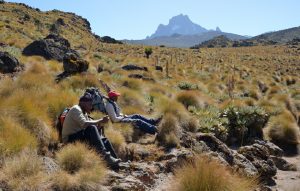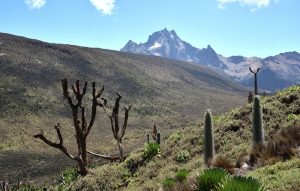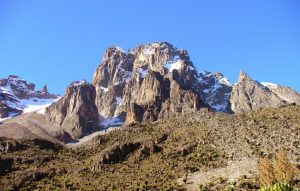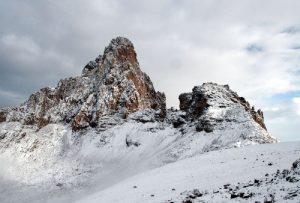Climbing Mount Kenya

Everything You Need To
Know
Forget the wildlife safaris, imagine standing at the top of the world’s tallest mountains in Africa, gazing down thousands of feet above sea level. Needless to say, Mt Kenya trekking remains on many people’s bucket lists when visiting Africa, and offers easy and challenging ascents with superb scenic beauty.
Mount Kenya is considered a more scenic trek and rises just at a height of 5,199 metres (17,057 feet) – the (2Nd) second highest mountain in Africa after Mount Kilimajaro. The mountain range comprises three main peaks: Batian, Nelion and Point Lenana.
The highest Mount Kenya peaks are Batian (5,199 metres) and Nelion (5,188 metres). Batian and Nelion require advanced rock climbing and mountaineering skills to conquer. It’s about 4,985 metres (16,355 feet) to Point Lenana’s summit, which can be reached by walking.
The Main Hiking Routes Up Mt Kenya
Most of the mountain hikers go up and down a combination of three routes – Sirimon, Chogoria & Naro Moru – which generally take about five to six days to complete.
There being five different main routes to climbing Mount Kenya, namely Sirimon (Offers one of the most beautiful approaches to the peaks), Chogoria (The Chogoria route passes by waterfalls and an incredible gorge), Naro Moru (The most popular descent route, fast and easy), Burguret (You’ll be navigating through the rainforest overnighting at wilderness campsites. Burguret route is often muddy and rough under foot) and Timau, the most common are the first four respectively.
The most popular climbing routes on Mt Kenya are – Chogoria, Sirimon & Naro Moru route. These routes also have supervised gates making them the most frequently used, while the other technical routes require special permission from the (KWS) Kenya Wildlife Service to hike.
The Technical Hiking Routes Up Mt Kenya
These technical Mount Kenya climbing routes range from 4,700 metres or 15,420 feet (Midget Peak) to Batian’s towering 5,199 metres (17,057 feet).
Most of the trekking routes up Mt Kenya require camping in tents, however, there are exceptions like Chogoria, Naro Moru, Sirimon routes that feature mountain huts. These basic structures/ cabins with log fires and running water.
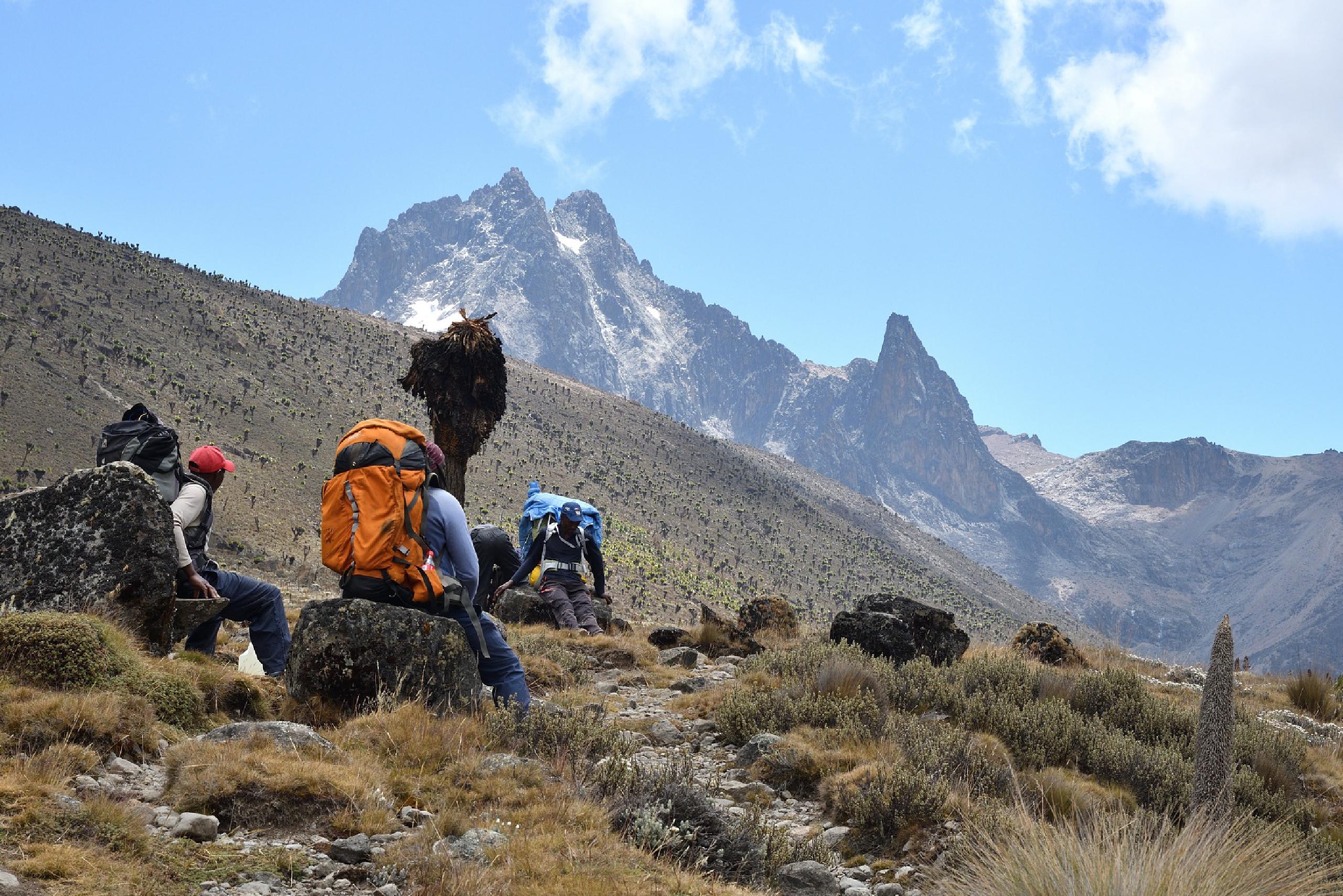
Sirimon
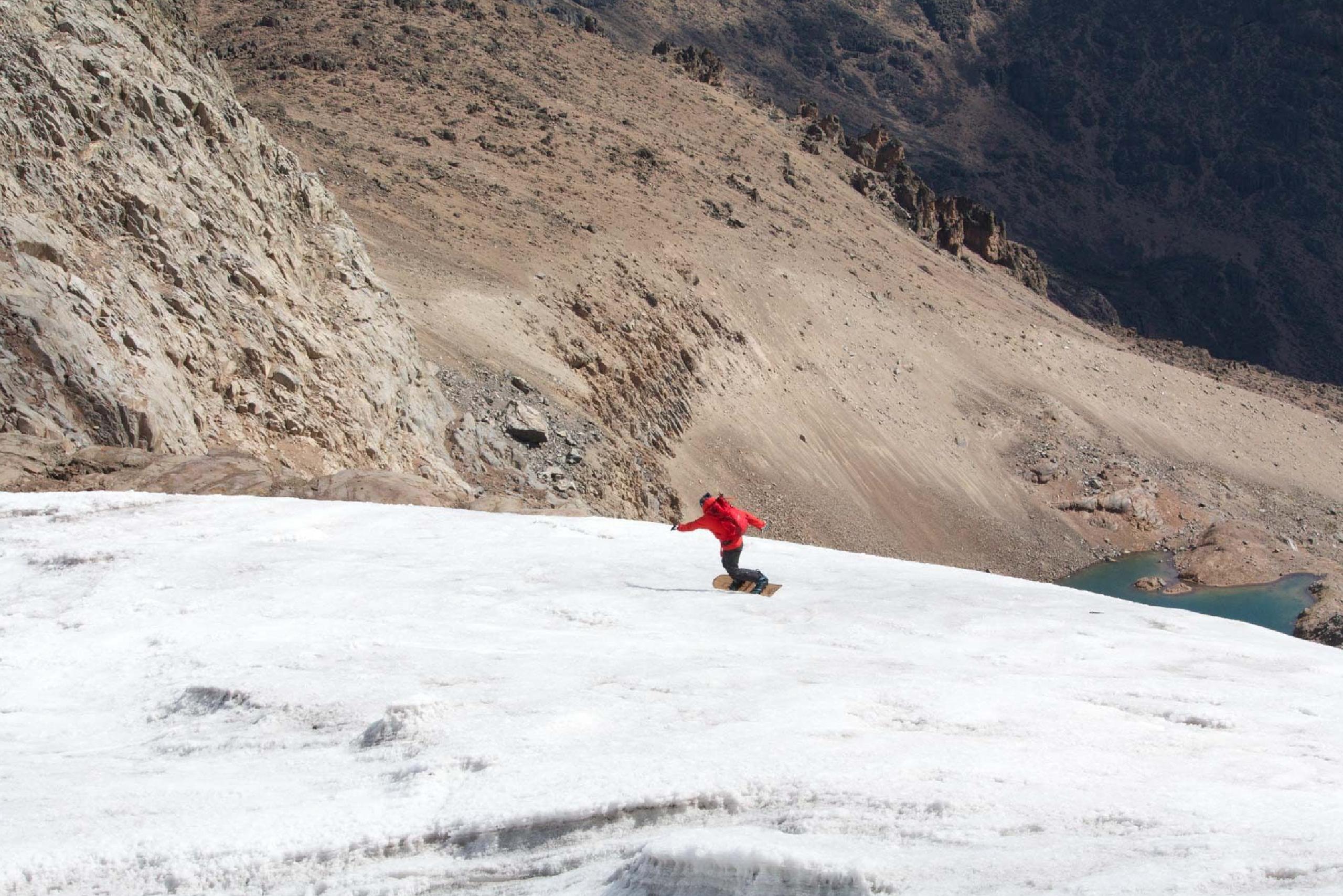
Chogoria
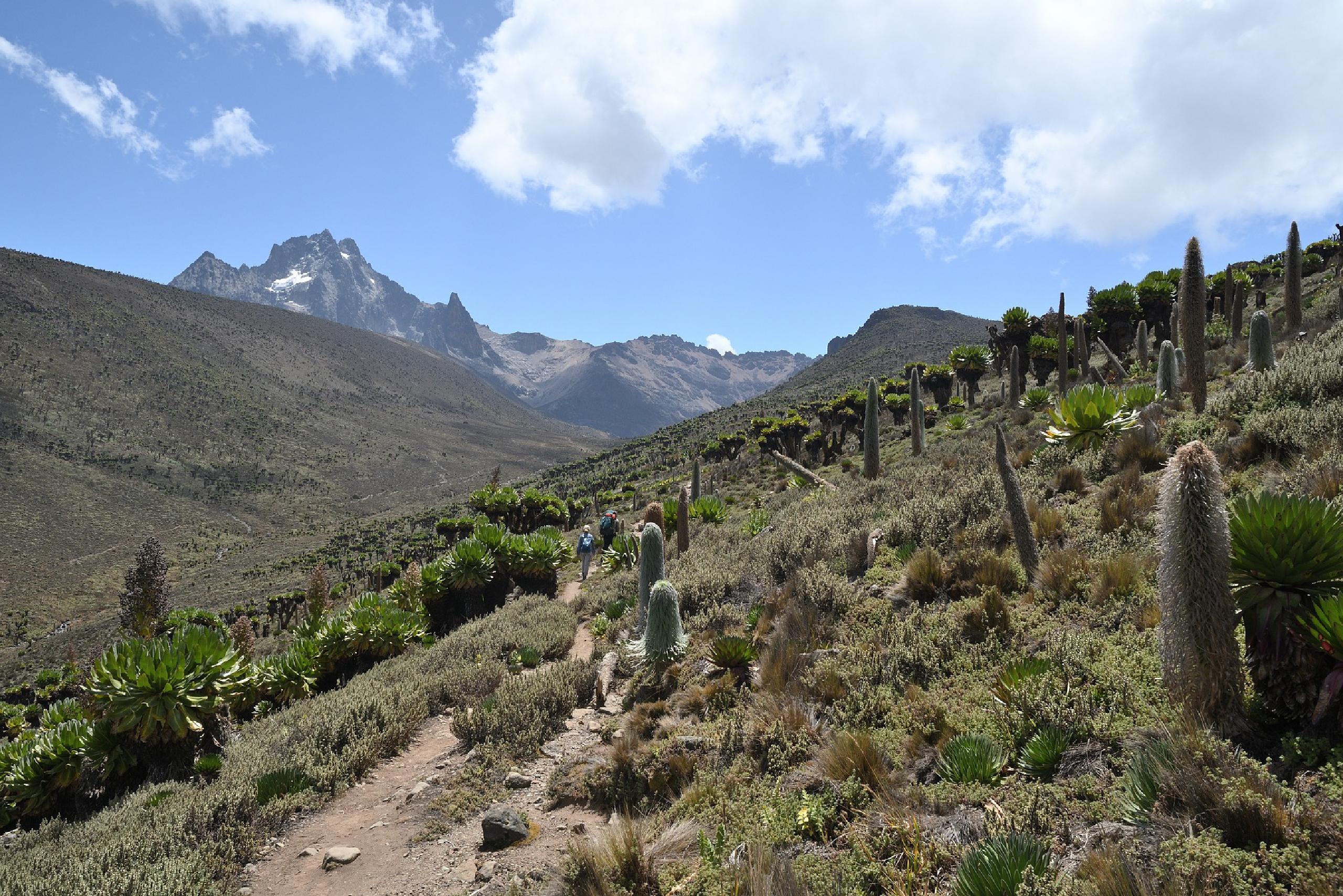
Naro Moru
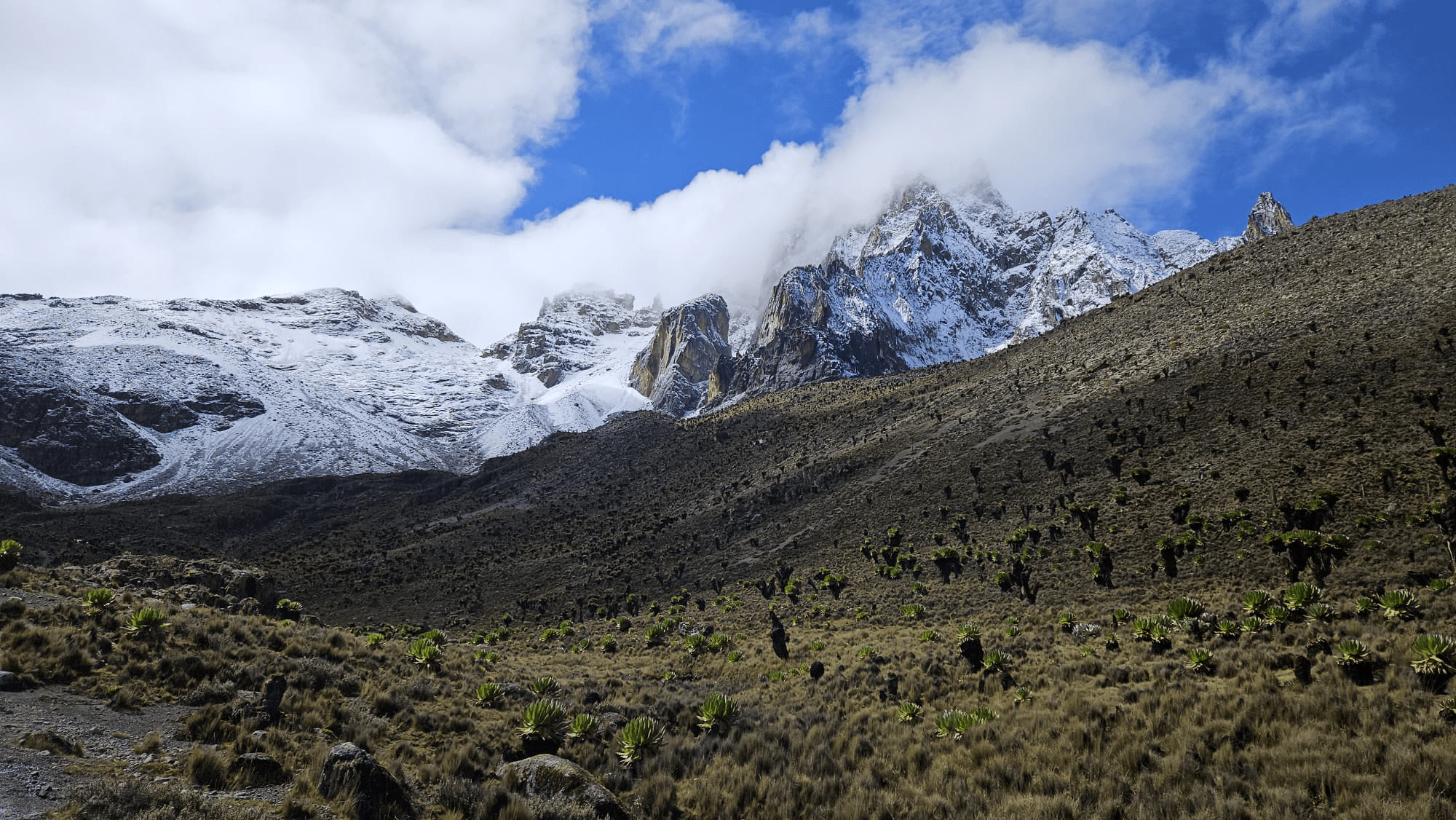
Burguret
Talk About Mount Kenya Beauty
Attractive with its variation in flora and fauna from rugged glacier-clad summits and forested middle slopes, Mount Kenya is one of the most impressive landscapes in East Africa, with about 20 glacial tarns (small lakes) of varying sizes.
The vegetation on the lower slopes are covered with dry upland forest, the true montane forest is mainly cedar and podocarpus including a dense belt of bamboo forest which merges into the upper forest of smaller trees, intermixed with grassy glades, moorlands, tussock grasslands and sedges. In this area the trees are festooned with high altitude moss.
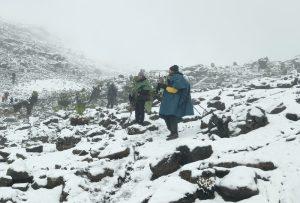
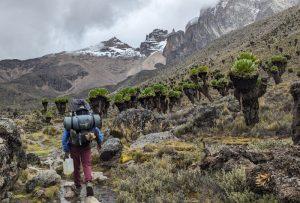
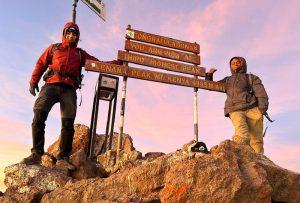
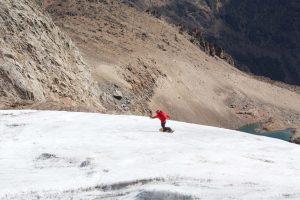
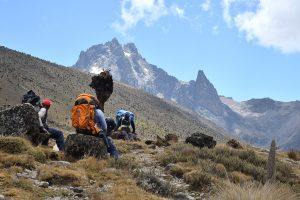
Wildlife That You Might See
The lower parts of Mount Kenya forest – the bamboo zone plays host to many different wildlife that you might come across, and they include; giant forest hog, tree hyrax, white-tailed mongoose, elephant, black and white colobus and sykes monkeys, genet cat, hyena, waterbuck, Mount Kenya mouse shrew, suni, black-fronted duiker and leopard.
Featured Mt Kenya Climbing Packages & Itineraries
Ready to start planning your trek up Mount Kenya?
Chat with someone who’s been there. Get in touch with our team of Africa safari experts to help tailor-make this tour and prepare you to climb Kenya’s highest mountain.
Listed below are our popular Mount Kenya group trekking tours.
4 Days Mount Kenya Trekking Tours
Mount Kenya Hike
5 Days Mount Kenya Climbing Tours
Mount Kenya Rock Climbing Tours
6 Days Mount Kenya Rock Climbing
7 Days Mount Kenya Hiking Tours
Frequently Asked Questions About Mount Kenya Safaris
Browse our guide to climbing Mount Kenya, a one stop section for all your Mount Kenya rock climbing tours. In case of any further questions don’t hesitate contact us and we’ll offer the support you need as you prepare for your Mount Kenya Hikes.
Protected by the Kenya Wildlife Service (KWS) and parts of the Mount Kenya Forest Reserve managed by the Kenya Forest Service (KFS), let’s break down Mt.Kenya and discuss things like budgets, fitness and trekking durations, climbing Mount Kenya tours plus answer questions like how tall is Mt Kenya, when is the best time to climb Mt Kenya, and more.
Mount Kenya National Park is a UNESCO World Heritage Site and most of it is protected by Mount Kenya National Park. It offers hikers breath-taking mountain scenery of glaciers, lakes, mineral springs, and alpine forests to trek through, as well as spotting some wildlife. Compared to Kilimanjaro, Mount Kenya is considered a more scenic trek. Mount Kenya is also regarded as a holy mountain by all the communities (Kikuyu and Meru) living next to it.
Although the mountain can be trekked all year-round, consider the best time to climb Mount Kenya during the cool dry seasons of January to March and June to October when the weather is warmer and clear skies which will be an added advantage to encourage hikers to tackle Mount Kenya.
Chat with us and get to understand more about the Mount Kenya destination guide.
For you to trek Mount Kenya, a reasonable level of fitness is required. You don’t need to be a super-fit athlete or experienced hiker since the trek is manageable to anyone with good basic fitness and mental readiness for the trek. The fitter you are, the more enjoyable your Mount Kenya adventure will be.
Tip – the best preparation for trekking up Mount Kenya is taking long walks at home – or better yet, going on a few hiking trips. Include some uphill areas and wear the clothes – especially boots and socks that you’ll be wearing during your Mount Kenya adventure.
Tip – the fitness requirement needed to trek Mount Kenya is to ensure you are mentally prepared about it since the biggest part of the challenge is always mental readiness. It is totally vital to prepare your mind for the excursion.
Remember to stay confident and remind yourself why you are climbing Africa’s highest mountains!
Our Mount Kenya climbing tours are led by our guides who are all licensed and have received training from the appropriate park authorities in regards to mountaineering which is important for your absolute peace of mind.
Altitude sickness – occurs when your body finds it difficult to adjust to low oxygen levels. Altitude sickness usually settles by itself and the main treatment involves going down to a lower altitude as safely as possible. Your guide may decide to send you back down the slopes to guarantee your safety. This usually involves returning to your previous campsite.
Our guide will ensure you have sufficient time to acclimatise properly to high altitudes, delivering the best success rate for summiting.
You can take an anti-altitude sickness medication’s to make your blood absorb more oxygen, – but first chat with your doctor about a prescription before your trek. Just remember, anti-altitude sickness medications are often diuretics.
Dehydration is a major contributor to altitude sickness, so make sure that you always have enough drinking water with you during any African mountain tours.
Many mountain climbers combine Mount Kenya trek with a week on safari. Even a grand finale on Kenya’s fine beaches are popular add-ons – get in touch with our Africa Vultures team to help tailor-make a trip that’s right for you.
The price of a guided trip up Mount Kenya National Park depends on factors like the time of year you wish to trek, the number of people in your booking group, and the duration of your trek. A general cost guideline is:
Mount Kenya – between USD 700 and USD 2,500 per person
The prices usually include: Road transfers to and from the mountains, Park fees, camping fees, rescue fees, and permits while on the mountain, Camping equipment, Meals and drinks, services of expert trekking crews (guides, cooks and porters).
During your African climbing tour, in the lower parts of Mount Kenya forest, the bamboo zone plays host to many different wildlife that you might come across, and they include; giant forest hog, tree hyrax, white-tailed mongoose, elephant, black and white colobus and sykes monkeys, genet cat, hyena, waterbuck, Mount Kenya mouse shrew, suni, black-fronted duiker and leopard.
While there are many campsites within the Mount Kenya National Park, situated close to entry gates mostly, there are a few semi-luxury and comfortable accommodation options within the park and nearby. Some of the hotels near Mount Kenya National Park include Anabas Mount Kenya National Park is located within the park while the resort property of Fairmont Mount Kenya is located just outside the park, 21 miles from the Simiron Gate.
Mau-Mau Caves offer a fascinating look back to the history of the 1950s while emotions are evoked when visiting the Animal Orphanage, home to the rare Bongo. Visitors can enjoy a nature walk in Mount Kenya National Park while guests staying at the Fairmont can enjoy bird watching outings departing from the grounds.
While Mount Kenya is a challenging and physically demanding climb, it is possible for all beginner-level hikers to successfully climb the mountain. However, most are only able to conquer the central area peaks because the high peaks requires some technical experts.
Are you feeling worried about the hike? Let our team offer suggestions based on our recommended list of our Mt Kenya climbing, trekking and hiking tours.
All our mountain climbing tours ensures you have enough time to acclimatize, which will often give you the best experiences. During your Mount Kenya climbing tour, you may also want to spend a day to rest your hike so giving yourself some extra time is a good idea. Hikers usually complete their Mount Kenya hikes in around four to six days.
If you like hiking challenges, Mount Kenya & Mount Kilimanjaro climbing adventures are some of the best tours you can undertake on your visit to Africa.
Mount Kenya sits on the eastern edge of the Central Highlands of Kenya about 193 km north-east of Nairobi and about 480 km from the Kenyan coast. There is a good road from Nairobi to the mountain. Driving from the Kenyan capital takes four hours.
